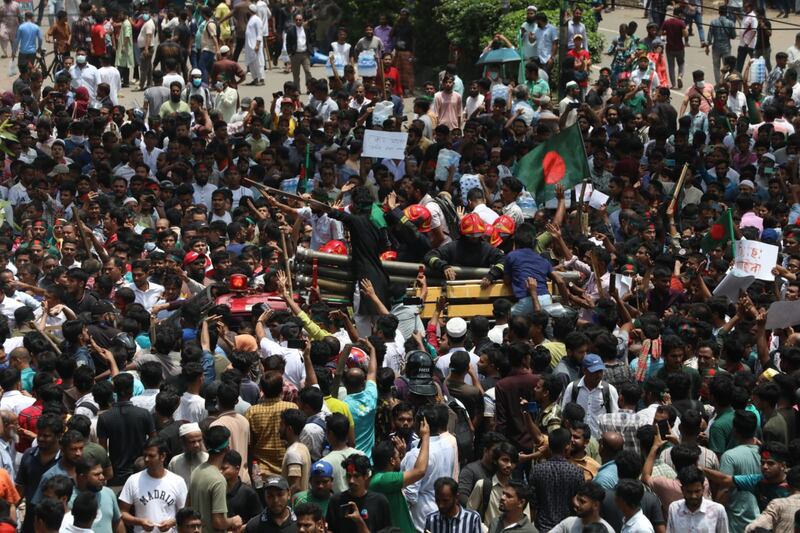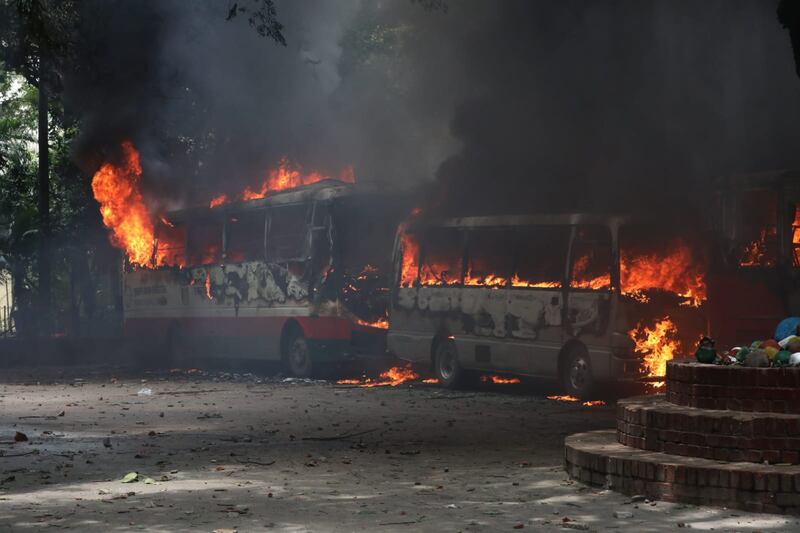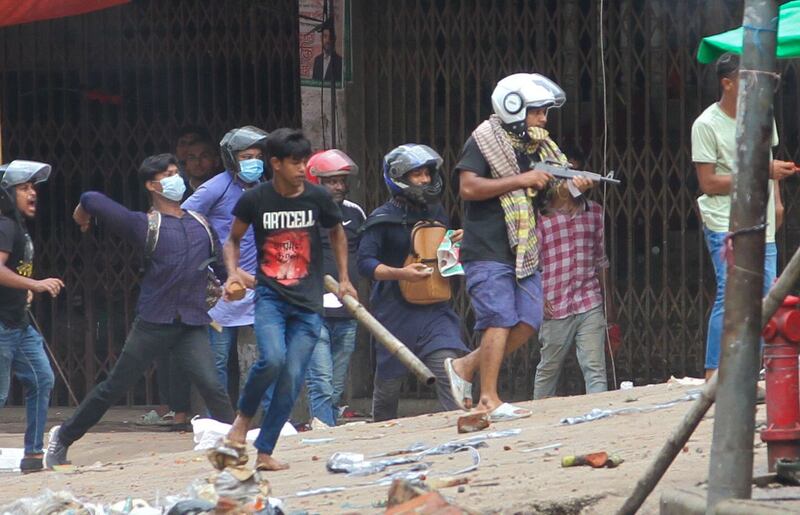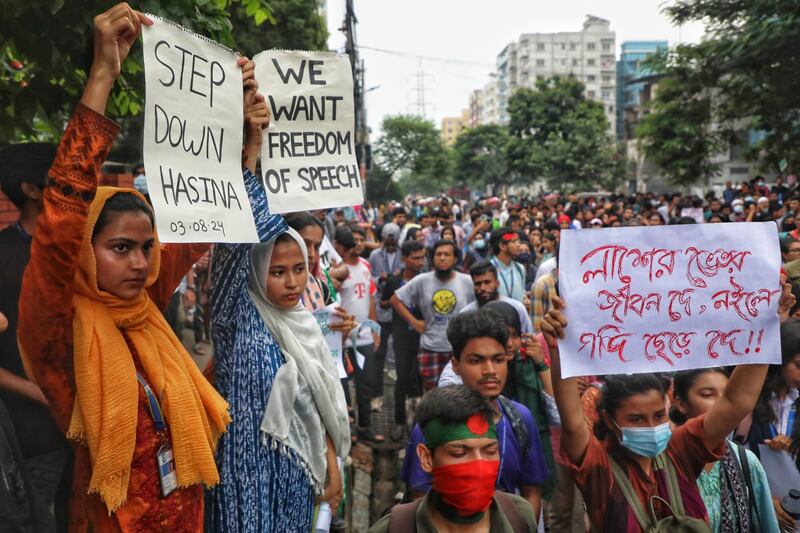UPDATED at 11:09 a.m. ET on 2024-08-04
Dhaka and other Bangladeshi cities erupted into fresh violence with dozens of deaths reported as thousands of students and other protesters took to the streets Sunday to demand that Prime Minister Sheikh Hasina and her government resign.
By the late afternoon, the Ministry of Home Affairs announced that an indefinite curfew would be enforced, starting at 6 p.m. The government also imposed a new internet shutdown mainly targeting mobile phones, and announced three days of public holidays, starting Monday.
Scores of people were reported injured as members of groups aligned with the ruling Awami League party clashed with students, who were officially launching a civil disobedience campaign that aimed to shut down the country by blocking roads and highways, and force Hasina to step down after 15 consecutive years in power.
Police also clashed with protesters, with the Associated Press reporting that police officers fired tear gas to disperse a large crowd in Dhaka’s Uttara neighborhood.
Sunday’s action marked a new phase of protests by students who had staged massive protests in July against quotas for government jobs. As part of their new “non-cooperation” campaign, the students were also calling on people to defy the government by not paying their tax or utility bills.
By about 9 p.m. (local time), at least 90 people were reported killed in Sunday’s turmoil across Bangladesh, according to reporting by Prothom Alo, the nation’s largest daily newspaper. And according to the latest reporting by Agence France-Presse, the news agency cited police and doctors as saying that at least 55 people had been killed. Reuters put the number of dead at at least 43.
In late-breaking news, the national police headquarters issued a statement on Sunday evening saying that 14 police officers had been killed in attacks on two police stations during the day.
The statement did not give details about how the officers were killed or who carried out the attacks. These left 13 officers dead at the station in Enayetpur, in northern Sirajganj district, and another officer dead at the station at Eliotganj, some 80 km from Dhaka.
On Sunday in Dhaka, protesters were said to have set fire to buses and other vehicles parked close to the Bangabandhu Sheikh Mujib Medical University hospital (BSMMU), a state-run health facility named after Hasina’s father, the founding leader of Bangladesh.
“She [Hasina] must step down and face trial,” said Nahid Islam, one of the coordinators of the Students Movement Against Discrimination, the group which launched the civil disobedience campaign, said during a peaceful rally in Dhaka’s Shahbagh neighborhood on Saturday.
He rejected an offer made by the prime minister on Saturday for talks aimed at negotiating an end to the political turmoil.
The students are demanding justice for the more than 200 people who lost their lives during the earlier wave of civil unrest last month, when students staged protests against a quota system for government jobs. It was heavily weighted in favor of children and grandchildren of war veterans who had fought for Bangladesh's independence from Pakistan in 1971.
As a result of those protests, the Supreme Court's appellate division slashed quotas for select groups to 7% from 56%, paving the way to make most government jobs merit-based in the country with a high unemployment rate among young people. At least two other people were reported killed in violence during anti-Hasina protests on Friday.

In the early hours of Sunday’s unrest, clashes took place between the agitating students and the rival leaders and activists of the Awami League and its front organizations in the capital Dhaka, Munshiganj, Chittagong, Faridpur and other cities.
Fire incidents were reported on the campus of BSMMU in Shahbagh, where the students clashed with the ruling party leaders and activists.
Dr. Sheikh Abdullah Al Mamun, a deputy director of the hospital, told journalists that some motorbikes and parked vehicles were set on fire.
“We could not stop them. They vandalized the information desk and entered the second floor and continued the rampage,” he said.
“The patients and their attendants have been in great panic. We are trying our best to stop further deterioration.”
At least two fatalities were reported in violence in Munshiganj, a city south of Dhaka.
“At our hospital, two people have died and 60 more people were injured. We are under stress,” Dr. Abu Hena Mohammad Jamal, the superintendent physician of the Munshiganj district hospital, told BenarNews at around 12:45 p.m. on Sunday.
Mohammad Badiuzzaman, an additional superintendent of police in Munshiganj, said protesters and ruling party leaders and activists had been locked in a series of clashes since 10 a.m.
“The whole town has become a pitched battle ground. Owing to public safety, we are not getting engaged,” he told BenarNews.

Leaders and activists belonging to Awami League and other affiliated groups, though in small numbers, had fanned out in the streets of various Dhaka neighborhoods in a bid to counter the students.
Armed with sticks and other small arms, the pro-government activists took up positions in Shahbagh at around 10 a.m. They set on and beat up some of the incoming students, a witness said.
“As the students came in large numbers, Chhatra League, Jubo League leaders and activists fled. Shops and establishments were vandalized indiscriminately,” Helal, an eyewitness who works at a hospital ward, told BenarNews.
“The students have taken over Shahbagh,” he said.
Moinul Hossain Khan Nikhil, general secretary of the Jubo League, led a ruling party gathering at Mirpur-10 intersection. His supporters were armed with sticks.

In Uttara, one of the trouble spots in Dhaka, the students had taken positions at Sector-7 and a group of women armed with hockey sticks had gathered near the Rajuk Uttara Model College.
The angry students set a police vehicle ablaze on the premises of a local court.

“The students have lost total faith in her government for they killed innocent students, calling them anti-liberation forces,” Shahrin Akhter, a student at Dhaka University who was not using her real name for safety reasons, said of Hasina, as she and her mother joined the protest rally on Saturday.
“This government killed scores of our brothers and sisters. Will they mete out justice? There is no meaning to ask for a trial from the students’ killers,” she said.
That same night, Home Minister Asaduzzaman Khan Kamal said that the quota reform movement had turned into a “political movement.” He told outlets that he was ready to resign if instructed to do so by the prime minister.
On Sunday, there was no immediate word issued by Bangladesh’s embattled prime minister, whose government was reelected in January amid allegations of vote rigging.
On Saturday, Sheikh Hasina invited the students to meet with her personally.
“The door of Ganabhaban is open. I want to sit with the agitating students of the movement and listen to them. I want no conflict,” Hasina said, according to the state-run Bangladesh Sangbad Sangstha (BSS) news service.

Meanwhile on Sunday, other parts of the capital Dhaka and the country’s economic nerve center, Chittagong, seemed abnormally deserted as people did not leave their homes, fearing violence. All major shops, factories and establishments remained closed.
“I have turned up at the office early, but we see a few customers. We are passing time almost without any work,” Md. Hafiz, a banker, told BenarNews on Sunday, the start of the working week in Bangladesh.
“Today is abnormally quiet in Uttara. People are not coming out,” Mahbub Hossain, a pizza seller in the Dhaka neighborhood, told BenarNews.
RELATED STORIES
[ 2 killed as Bangladesh protests swell; demands grow for PM Hasina’s resignationOpens in new window ]
[ Bangladesh: Hasina meets with families of the dead as arrests continueOpens in new window ]
[ Night-time police raids spread fear across Dhaka in unrest aftermathOpens in new window ]
[ Relatives fight bureaucracy to claim bodies after Bangladesh clashesOpens in new window ]
This article has been updated to revise the death toll as reported by Prothom Alo and other news outlets, and to add a new photo.
